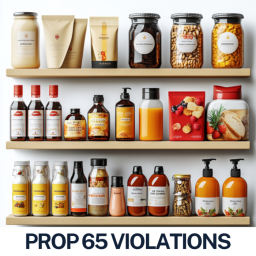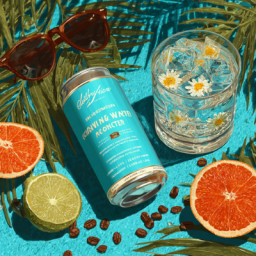
The following is a summary of relevant, notable Class Action Lawsuits that were filed in June 2024. Below is a summary of the plaintiff’s allegations. To request a copy of a particular complaint or for queries or further discussion, you’re welcome to reach out via email at [email protected].
1. Donna Bell v Greenbrier International, Inc. doing business as Dollar Tree
Donna Bell has initiated a class action lawsuit against Greenbrier International, Inc., operating as Dollar Tree, and Colonna Brothers, Inc., in the United States District Court for the Southern District of New York, over alleged undisclosed lead contamination in Supreme Tradition Ground Cinnamon. The complaint states that this product, sold by Dollar Tree and manufactured by Colonna Brothers, contains lead—a toxic metal linked to serious health risks, including irreversible brain damage, particularly in children. The lawsuit argues that the defendants misrepresented the product as safe despite its dangerous lead levels, violating consumer trust and causing purchasers financial harm by selling a product they would not have bought had they known of the contamination.
This action follows an FDA investigation that found elevated lead levels in the product, leading to an FDA safety alert and a recall initiated on March 6, 2024. The plaintiff seeks damages, injunctive relief, and restitution, arguing that without adequate safety measures and truthful labeling, consumer harm will continue. The suit requests the certification of a national class and a New York subclass, with claims under New York General Business Laws for deceptive acts and false advertising, and a claim for unjust enrichment, emphasizing the ongoing risk to consumers posed by the product.
2. Amy Degioanni v Topco Associates, LLC
Amy Degioanni has initiated a class action lawsuit against Topco Associates, LLC in the United States District Court for the Southern District of Texas, claiming that Topco’s Food Club fruit and grain cereal bars are falsely advertised as “Naturally Flavored” despite containing synthetic DL malic acid. The complaint argues that this labeling misleads consumers into believing the bars are natural and free of artificial additives, causing them to pay a premium for products that actually include a chemical derived from petrochemical sources. Degioanni, representing herself and other similarly situated consumers, alleges that the products were purchased under the pretense of being naturally flavored based on these claims. The lawsuit, asserting violations of the Texas Deceptive Trade Practices Act (TDTPA), seeks class certification for Texas consumers who purchased the bars since August 16, 2019, and demands actual and punitive damages, restitution, declaratory and injunctive relief, attorney’s fees, and other appropriate relief. The case underscores the importance of truthful labeling and seeks to prevent Topco from continuing such deceptive practices in the future.
3. Brandon Faye v Doctors Scientific Organica, LLC doing business as Smart for Life
Brandon Faye has initiated a class action lawsuit against Doctors Scientific Organica LLC, doing business as Smart for Life, alleging false advertising and misbranding of their protein bars. Filed in accordance with the Class Action Fairness Act, the suit claims that the protein bars, advertised to contain between 12 and 20 grams of protein, consistently fell short by 6% to 22% according to independent tests. Faye, who depends on precise nutritional content for his fitness regimen, argues that this discrepancy led to economic damages as he paid premium prices for products that did not meet their labeled specifications. The lawsuit covers all affected consumers within the past four years, highlighting violations of the Florida Unfair and Deceptive Trade Practices Act (FUDTPA), unjust enrichment, and breach of express warranties. Seeking class certification under Federal Rule of Civil Procedure 23, Faye contends that the class action is the most effective means to address the widespread issues, due to the uniform nature of the alleged misrepresentations and the relatively minor individual damages per class member. The complaint demands actual damages, injunctive relief to prevent future deceptive practices, corrective advertising, and attorneys’ fees and costs, emphasizing the necessity of legal action to prevent ongoing consumer harm from misleading product labeling.
4. Joel Hawes v Mead Johnson & Company, LLC., Reckitt Benckiser, LLC.
Joel Hawes has initiated a class action lawsuit against Mead Johnson & Company, LLC, Reckitt Benckiser, LLC, and associated parties in the United States District Court for the Northern District of California, citing unlawful, unfair, and fraudulent business practices and false and misleading advertising in relation to their Enfamil Infant Formula products, including Enfamil NeuroPro, Enfamil Simply Plant-Based, and Enfamil Milk-based Infant Formula. The complaint centers on the undisclosed presence of perfluoroalkyl and polyfluoroalkyl substances (PFAS), also known as “forever chemicals,” which have been linked to serious health risks such as cancer, liver damage, and developmental issues. Independent testing confirmed detectable levels of organic fluorine, a marker for PFAS, in these products. Despite marketing claims of safety and rigorous quality checks, Hawes argues that the defendants misled consumers by failing to disclose critical information about these harmful substances, which would have influenced purchasing decisions. The complaint seeks corrective advertising, restitution, damages, and an injunction against further false advertising, asserting that the defendants acted willfully and in disregard of consumer safety. The lawsuit advocates for class certification as the optimal way to address the widespread impact of these deceptive practices, requesting attorney fees and further appropriate relief to address the common legal and factual questions affecting numerous consumers.
5. Andrew Levit v Nature’s Bakery, LLC.
Andrew Levit has filed a class action lawsuit against Nature’s Bakery, LLC in the Northern District of California, alleging consumer fraud, breaches of express and implied warranties, negligent and intentional misrepresentation, and unjust enrichment. The suit claims Nature’s Bakery misleadingly markets its fig bars as healthy by using terms like “Wholesome Baked In” and featuring heart and fruit imagery, despite the bars containing 19 grams of total sugar per serving—14 grams of which are added sugars, constituting 28% of the product’s total calories. This high sugar content, linked to various chronic health conditions, contradicts their healthy marketing claims. Levit argues that this deceptive marketing led consumers to believe the snacks were healthful, causing them to pay a premium under false pretenses. The lawsuit seeks compensatory and punitive damages, corrective advertising, restitution, and an injunction to halt misleading marketing practices, emphasizing the need for transparency in labeling to prevent consumer harm.
6. Dominique Lopez v Mead Johnson Nutrition Company and Mead Johnson & Company, LLC.
Dominique Lopez has initiated a class action lawsuit against Mead Johnson Nutrition Company and Mead Johnson & Company, LLC, alleging violations of California consumer protection laws, including the Unfair Competition Law, the False Advertising Law, and the Consumers Legal Remedies Act. The lawsuit claims that Mead Johnson’s Enfamil infant formulas contain undisclosed harmful levels of heavy metals such as arsenic, cadmium, and lead, contrary to the company’s marketing that promotes the products as safe and nutritious. The presence of these heavy metals, which can cause developmental delays and neurotoxicity in infants, was confirmed through independent testing, highlighting the discrepancy between actual product safety and advertised claims.
Lopez argues that this omission of critical safety information misled consumers, causing them to purchase products under false pretenses and exposing infants to significant health risks. The complaint also notes that other manufacturers have produced infant formulas without detectable levels of these contaminants, proving that safer production practices are possible. Seeking injunctive and monetary relief, Lopez demands that sales of the contaminated formulas be halted until they are verified as free from heavy metals, alongside corrective advertising, compensatory and punitive damages, and restitution for the economic damages suffered by the class members. This case underscores the defendants’ alleged negligence in failing to disclose and address the presence of harmful contaminants in their infant formula products.
7. Dominick Pizzo v Walgreen Co.
Dominick Pizzo has filed a class action lawsuit against Walgreen Co. and other unnamed defendants, alleging deceptive marketing practices regarding their “Triple Hydration” electrolyte drink mixes which are prominently advertised as containing “No Preservatives,” yet include citric acid and ascorbic acid—both recognized by the FDA as preservatives. This contradiction, Pizzo claims, constitutes a breach of warranty, implied contract, and results in unjust enrichment, violating the Missouri Merchandising Practices Act (MMPA). He argues that the misleading claim exploits consumers’ quick shopping decisions, especially since the citric acid used is often synthesized from genetically modified black mold. The lawsuit aims to represent all consumers misled by these claims, highlighting that Walgreens was aware the products were not preservative-free, leading consumers to overpay for what they believed were healthier options. The filing seeks compensatory damages, restitution, injunctive relief, and further remedies under Missouri law and other state consumer protection statutes, referencing past FDA actions to underscore the need for honest product labeling and to prevent ongoing consumer deception.
8. Bryant Preudhomme v Prime Hydration, LLC.
Bryant Preudhomme has filed a class action lawsuit against Prime Hydration, LLC, accusing the company of deceitfully marketing its “PRIME Energy” drinks by misrepresenting the caffeine content as 200 mg per can, whereas independent testing revealed higher levels. This mislabeling, Preudhomme asserts, has led to significant health risks, especially for minors who form part of the target consumer base, with potential severe effects such as rapid heartbeats and seizures. Filed in New York, the lawsuit seeks injunctive relief to enforce accurate labeling and monetary compensation for consumers misled by these claims, under the jurisdiction of the Class Action Fairness Act due to the diversity of citizenship among class members and an amount in controversy exceeding $5 million. The claims are based on violations of New York’s General Business Law Sections 349 (Deceptive Acts or Practices) and 350 (False Advertising), alongside allegations of unjust enrichment. Preudhomme’s action emphasizes the need for rectification from Prime to address the deceptive practices, and seeks class certification for both a national class and a New York subclass, highlighting the widespread and severe impact of the misleading business practices and calling for appropriate legal remedies for affected consumers.
9. Guan Small v Welch Foods Inc.
Guan Small has initiated a class action lawsuit against Welch Foods Inc., A Cooperative, in a claim that Welch’s Fruit Snacks, marketed as containing “No Preservatives,” actually include citric acid and ascorbic acid, both recognized as preservatives by FDA standards. Filed on behalf of Small and similarly situated purchasers, the lawsuit alleges that Welch’s misleading representations have unjustly enriched the company, constituting violations of New York General Business Law (GBL) §§ 349 and 350, breach of express warranty, and unjust enrichment. Small contends that the labeling misled consumers into believing the products were entirely preservative-free, influencing their purchasing decisions under the assumption of better health benefits. He argues that he would not have purchased or would have paid less for the snacks had he been aware of their true composition. The lawsuit seeks class certification for all affected U.S. purchasers, with a specific subclass for New York residents, citing common legal and factual questions about the nature of the ingredients and the deceptive marketing practices. Small is demanding compensatory and statutory damages, restitution, an injunction against further misleading marketing, reasonable attorney’s fees, and expenses, culminating in a demand for a jury trial to address these widespread misleading practices and their impact on consumers.
10. Joelle Thomas v Wegmans Food Markets Inc.
Joelle Thomas has filed a class action lawsuit against Wegmans Food Markets Inc. in the Supreme Court of the State of New York, Monroe County, alleging that Wegmans falsely marketed its sunscreen product as “Reef Conscious” and “Octinoxate & Oxybenzone Free.” Thomas claims that despite the labeling, the sunscreen contains avobenzone, homosalate, octisalate, and octocrylene—ingredients harmful to coral reefs and marine ecosystems. This discrepancy, she argues, misleads consumers who believe they are purchasing an environmentally safe product, thus violating federal and state laws that protect against deceptive practices and promote honest marketing. The complaint asserts that Wegmans’ marketing exploits environmental concerns and does not meet legislative standards for reef-safe sunscreens.
Thomas alleges economic damages due to paying a premium for a product under false pretenses and seeks class certification for all affected New York purchasers, monetary damages, legal fees, and other appropriate relief. The lawsuit highlights Wegmans’ significant business transactions within New York, marketing the product statewide through its 49 stores and online, underlining the broad impact of the alleged deceptive practices. She demands the court address these misleading marketing practices, which constitute false advertising, unfair trade practices, and consumer deception under General Business Law and other relevant statutes, with Spencer Sheehan of Sheehan & Associates P.C. appointed as lead counsel.
11. Mark Trammell v Albertsons Companies, Inc.
Mark Trammell has initiated a class action lawsuit against Albertsons Companies, Inc. in the United States District Court for the Southern District of California, alleging that Albertsons’ Signature Select Fruit & Grain cereal bars, advertised as “Naturally Flavored,” actually contain artificial DL malic acid derived from petrochemicals. Trammell contends that this constitutes false advertising and misbranding under federal and state laws, as he and other consumers were misled into purchasing products they believed were naturally flavored. The lawsuit seeks class certification, injunctive relief to prevent further misleading advertising, monetary damages, restitution, and corrective advertising to rectify the misleading claims. Filed under the Class Action Fairness Act, the complaint accuses Albertsons of violating the Consumer Legal Remedies Act (CLRA), resulting in unjust enrichment and breach of express warranty, as the products did not conform to their marketed natural composition. Trammell argues that the class action is essential to address the widespread deceptive practices and ensure that consumers can make informed decisions, emphasizing the need for Albertsons to undertake corrective measures and adequately compensate affected consumers.
12. Nathan Vidal, Debra Kennick, Abdjul Martin, and Eduardo Granados v The Hershey Company
Nathan Vidal, Debra Kennick, Abdjul Martin, and Eduardo Granados have filed a class action lawsuit against The Hershey Company in the United States District Court for the Southern District of Florida, alleging false advertising of several Reese’s Peanut Butter products. The plaintiffs claim that the product packaging depicted intricate carved-out artistic designs, such as detailed facial features, which were absent on the actual products—specifically naming Reese’s Medal, Reese’s Peanut Butter Pumpkins, and other themed items as examples. They contend that these misleading representations on the packaging led them to purchase the products under the belief that they featured detailed designs, only to find them blank. This discrepancy prompted claims under the Florida Deceptive and Unfair Trade Practices Act, asserting that Hershey’s actions constituted unfair and deceptive practices. The complaint, supported by screenshots and descriptions comparing the packaging and the actual products, argues that the misleading packaging significantly influenced their decision to buy these items. The plaintiffs seek compensatory damages, attorney’s fees, and class-action certification for all affected consumers in Florida, citing diversity jurisdiction and an amount in controversy exceeding $5 million. They are demanding corrective advertising and financial compensation for the alleged deceptive marketing that led to their financial losses, alongside broader corrective actions to prevent future consumer deception.













